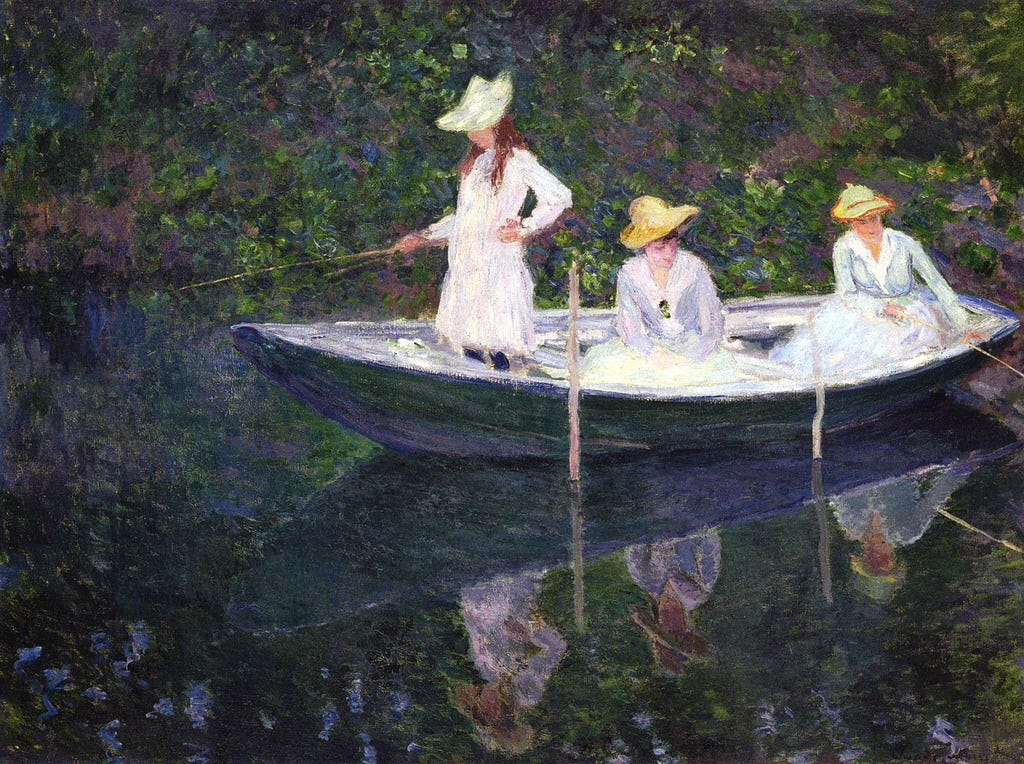Claude Monet: La barque à Giverny (1887), courtesy Wikimedia Commons
The concept of the attention economy was introduced in the early 1970s when Herbert Simon, an American Economist, Psychologist, and Nobel Prize in Economics laureate talked about the ‘Scarcity of Attention’ caused by the wealth of information. With the arrival of the Internet in the 90s, Simon's concerns about an upcoming information overload became real, as digital content became ever-present.
Jenny Odell, born in 1986 in San Francisco, California, earned a Bachelor of Arts in English Literature from the University of California, and a Master of Fine Arts in Design and Technology from the San Francisco Art Institute. In 2013 she began teaching Internet art and digital design at Stanford University.
Odell’s background led her to an approach combining art, writing, and social studies, exploring technology, ecology, and the complexity of modern life.
In 2015 she was resident artist in the Recology waste processing plant in San Francisco, with full access to discarded materials, an unrestricted budget, and an individual studio space. She created the ‘Bureau of Suspended Objects’ project, collecting and archiving discarded objects to explore their histories and socio-economic context, creating a detailed online archive showcasing the objects and research on their manufacturing and distribution processes.
In 2019, Odell published the book ‘How to Do Nothing: Resisting the Attention Economy’, an exploration of modern society's obsession with productivity and constant engagement.
The book critiques the constant demand for attention and challenges the conventional concept of productivity, promoting a more relaxed mindset that prioritizes reflection and genuine connection over constant activity.
For Odell, ‘doing nothing’ can be a radical act of resistance against social pressure. She links the the concept of ‘Deep Listening’, developed by Pauline Oliveros, an American composer, accordionist, and pioneer of experimental music, with practices like bird-watching:
“The goal and the reward of Deep Listening was a heightened sense of receptivity and a reversal of our usual cultural training, which teaches us to quickly analyze and judge more than to simply observe.
When I learned about Deep Listening, I realized I had unwittingly been practicing it for a while—only in the context of bird-watching … what this practice has in common with Deep Listening is that observing birds requires you quite literally to do nothing. Bird-watching is the opposite of looking something up online.”
Odell examined the history of attempts to drop out of society, especially communal living in the 1960s. She suggests that simply dropping out does not address the problems of the attention economy and that true resistance involves critical social engagement rather than a complete withdrawal.
Odell notes the relationship between attention and willpower, arguing that our capacity for attention is under attack by an economy designed to exploit it. She discusses various practices that can help us regain control over our attention, such as mindfulness and engaging with nature. She points out that attention is a limited resource and states that by consciously choosing to direct our attention towards nature, art, and community, we can have richer experiences and connections, and rise above the limits of superficial digital interactions.
For Odell, community participation is the way to resist the isolation brought on by social media. She encourages readers to engage with their local community to strengthen their sense of belonging and purpose.
In her second book ‘Saving Time: Discovering a Life Beyond the Clock’ (2023), Odell examines the concept of time, questioning the dominant, profit-driven perception that is currently prevailing.
Odell examines how time has turned into a commodity in modern society. She claims that our lives have become a series of moments to be packaged and sold, reflecting a mindset that promotes productivity over human experience.
Odell invites us to explore non-Western and pre-industrial concepts of time, which are more fluid and connected to natural rhythms, encouraging a shift from viewing time as a commodity towards understanding it as a means to achieve connection and growth.
One other interesting aspect of Odell's argument is her incorporation of ecology into time. She explains how natural processes such as the change of the seasons, the growth of plants, and animal migrations, offer valuable insights into living in harmony with time rather than against it.
To reclaim time, Odell suggests an approach that cultivates a sense of community and mutual support, allowing individuals to share their time more freely rather than saving it for competitive advantage.
For Odell, time resembles gardening - it must be nurtured, cultivated, and shared rather than optimized and consumed. She encourages readers to live fully their experiences rather than passively spending time. She invites us to slow down and reflect on our relationship with time, valuing moments for their richness rather than their efficiency.
See also:
The ‘Bureau of Suspended Objects’ page on Jenny Odell’s website



